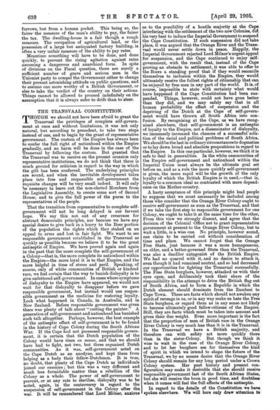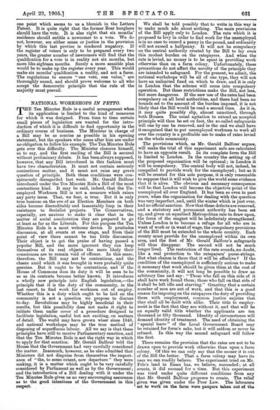That the transition from representative to complete self- government will
not be long delayed is our fervent hope. We say this not out of any reverence for abstract democratic principles, nor because we have any special desire to give back in a hurry to the Boer portion of the population the rights which they staked on an appeal to arms and lost in fair fight. We want to see responsible government established in the Transvaal as quickly as possible because we believe it to be the great antiseptic of Empire. We have proved again and again in the past that the more complete the self-government of a Colony—that is, the more complete its nationhood within the Empire—the more loyal it is to that Empire, and the more helpful in time of stress and peril. Speaking, of course, only of white communities of British or kindred race, we feel certain that the way to banish disloyalty is to give unfettered self-government. In cases where symptoms of disloyalty to the Empire have appeared, we would not wait for that disloyalty to disappear before we gave responsible government, but instead would use respon- sible government as the medicine for restoring loyalty. Look what happened in Canada, in Australia, and in New Zealand. Before responsible government was given there was plenty of talk about "cutting the painter." A generation of self-government and nationhood has banished such talk altogether. Perhaps, however, the best example of the antiseptic effect of self-government is to be found in the history of Cape Colony during the South African War. If the Cape had not possessed responsible govern- ment, it is certain that the Dutch population of the Colony would have risen en masse, and that we should have had to fight, not two, but three organised Dutch communities. As it was, self-government acted on the Cape Dutch as an anodyne, and kept them from helping as a body their fellow-Dutchmen. It is true, no doubt, that plenty of the Cape Dutch as individuals joined our enemies ; but this was a very different and much less formidable matter than a rebellion of the Colony as a whole. The power of self-government to prevent, or at any rate to sterilise, disloyalty was to be noted, again, in the controversy in regard to the suspension of self-government in the Colony after the war. It will be remembered that Lord Milner, anxious as to the possibility of a hostile majority at the Cape interfering with the settlement of the two new Colonies, did.
his very best to induce the Imperial Government to suspend the Cape Constitution. If such suspension did not take place, it was argued that the Orange River and the Trans- vaal would never settle down in peace. Happily, the Imperial Government rejected Lord Miler's urgent appeal for suspension, and the Cape continued to enjoy self- government, with the result that, instead of the Cape proving an obstacle to settlement, it was able to offer to the Boers a standing proof that if they would reconcile themselves to inclusion within the Empire, they would ultimately receive the fullest rights of citizenship that can be enjoyed by free men in any part of the world. It is, of course, impossible to state with certainty what would have happened if the Cape Constitution had been sus- pended. Things, however, could not have gone better than they did, and we may safely say that in all human probability the effect of suspension and the depriving of the Dutch at the Cape of self-govern- ment would have thrown all South Africa into con- fusion. By recognising at the Cape, as we have recog- nised elsewhere, that self-government is an antiseptic of loyalty to the Empire, not a disseminator of disloyalty, we immensely increased the chances of a successful solu- tion of the racial and political problems of South Africa. We shouldbe the last in ordinary circumstances to dogmatise or to lay down broad and absolute propositions in regard to the Empire. In this one particular, however, we think it is safe to deal in generalities. In the white communities of the Empire self-government and nationhood within the Imperial Union must always be the ultimate goal set before us, and as a rule the more quickly self-government is given, the more rapid will be the growth of the only loyalty of which the British Empire is in need,—that is, loyalty to a common ideal as contrasted with mere depend- ence on the Mother-country.
A hasty acceptance of this principle might lead people to suppose that we must necessarily be included among those who consider that the Orange River Colony ought to receive self-government as soon as the Transvaal, and that if we take the first step to responsible government for one Colony, we ought to take it at the same time for the other, From this view we strongly dissent, and agree that the decision of the Colonial Office not to grant representative government at present to the Orange River Colony, but to wait a little, is a wise one. No principle, however sound, can claim to be carried out without consideration of time and place. We cannot forget that the Orange Free State, just because it was a more homogeneous, an older, and a better-governed State than the Transvaal, was also a deadlier antagonist of the British Empire. We had no quarrel with it, and no desire to attack it, even though it had remained neutral, and so had decreased our opportunities for fighting the Transvaal successfully. The Free State burghers, however, attacked us with their eyes open, and deliberately took their share of the responsibility in the attempt to drive the British flag out of South Africa, and to form a Republic in which the Dutch element should dominate from the Zambesi to Cape Town. These are facts which should not awaken any spirit of revenge in us, or in any way make us hate the Free State burghers, or regard them as in any sense not likely to become ultimately good fellow-citizens of the Empire. Still, they are facts which must be taken into account and given their due weight. Even more important is the fact that the proportion of men of British race in the Orange River Colony is very much less than it is in the Transvaal. In the Transvaal we have a British majority, and therefore can with safety act more quickly there than in the sister-Colony. But though we think it wise to wait in the case of the Orange River Colony, and to let her burghers see for themselves the kind of spirit in which we intend to shape the future of the Transvaal, we by no means desire that the Orange River Colony should remain for any long period under a Crown Colony system. Her past history and present con- figuration may make it desirable that she should receive responsible government last of the South African States, but she will receive the boon in good time, and doubtless when it comes will feel the full effects of the antiseptic.
In regard to the details of the Constitution we have spoken elsewhere. We will here only draw attention to one point which seems to us a blemish in the Letters Patent. It is quite right that the former Boer burghers should have the vote. It is also right that six months' residence should entitle a newcomer to a vote. We do not, however, see either sense or justice in the provision by which this last proviso is rendered nugatory. If the register of voters is only to be prepared every two yea/13, the greater number of newcomers will find that the qualification for a vote is in reality not six months, but more like eighteen months. Surely a more sensible plan would be to make up the register every year. This would make six months' qualification a reality, and not a farce. The regulations to ensure "one vote, one value," are thoroughly sound, and should prove welcome to all who accept the democratic principle that the rule of the majority must prevail.



















































 Previous page
Previous page